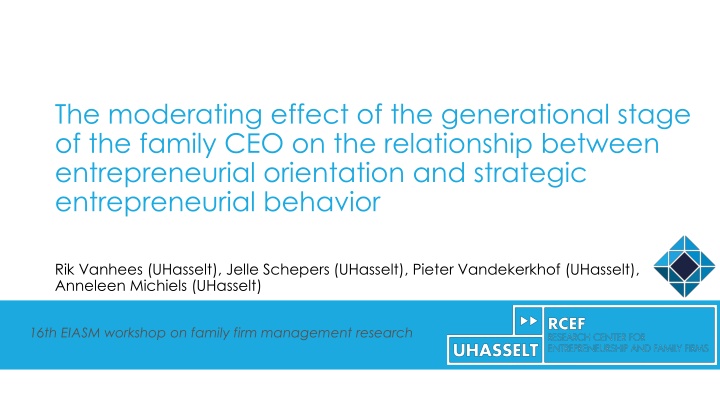
Generational Influence on Entrepreneurial Behavior in Family Firms
"This research delves into the impact of the generational stage of family CEOs on the relationship between entrepreneurial orientation and strategic entrepreneurial behavior in family businesses. The study aims to bridge the intention-action gap and explores how the presence of external members in the Board of Governors moderates this relationship. Hypotheses are formulated, and a method involving an online survey of 147 private Belgian family businesses is outlined."
Download Presentation

Please find below an Image/Link to download the presentation.
The content on the website is provided AS IS for your information and personal use only. It may not be sold, licensed, or shared on other websites without obtaining consent from the author. If you encounter any issues during the download, it is possible that the publisher has removed the file from their server.
You are allowed to download the files provided on this website for personal or commercial use, subject to the condition that they are used lawfully. All files are the property of their respective owners.
The content on the website is provided AS IS for your information and personal use only. It may not be sold, licensed, or shared on other websites without obtaining consent from the author.
E N D
Presentation Transcript
The moderating effect of the generational stage of the family CEO on the relationship between entrepreneurial orientation and strategic entrepreneurial behavior Rik Vanhees (UHasselt), Jelle Schepers (UHasselt), Pieter Vandekerkhof (UHasselt), Anneleen Michiels (UHasselt) 16th EIASM workshop on family firm management research
Problem statement / gap Current research: EO leads to performance Differential outcomes Intention-action gap Assumption: orientation results in behavior
Problem statement / gap Lack of family firm focus Impact family CEO Upper echelon theory (Hambrick & Mason, 1984) Generational aspect
Research objective Investigate whether: the concept of SEB fills the intention-action gap between EO and performance; the generational stage of the family CEO impacts the EO-SEB relationship; the moderating impact changes based on the presence of at least 1 external member in the BOG.
Conceptual research model H1 H3 H2 Entrepreneurial Orientation (Miller, 1983; Covin & Slevin, 1989) Strategic Entrepreneurial Behavior (Anderson et al., 2019)
Hypotheses* Hypothesis 1: The family firm s entrepreneurial orientation positively influences SEB Hypothesis 2: The generational stage of the family CEO will moderate the relationship between EO and SEB, in such a way that the EO-SEB relationship is strongest in first-generation family firms and decreases when the family business is led by second-, third- or later-generation family CEOs. Hypothesis 3: The moderating effect of the generational stage of the family CEO on the EO-SEB relationship will be reversed, when the family business has a BOG with at least 1 external member, in such a way that: - The positive effect of EO on SEB decreases when firm that are led by first- generation family CEOs have a BOG with at least one external member; - The positive effect of EO on SEB increases when firms that are led by second-, third- or later-generation family CEOs have a BOG with at least one external member;
Method Sampling Online survey, constructed via Qualtrics Targeted sampling 147 private Belgian family businesses
Method Data-processing Quantitative research via the PROCESS-macro by Hayes (2013) IBM SPSS Version 26 Moderated moderation model (3)
Preliminary results Hypotheses Hypothesis 1 Hypothesis 2 Effect Direct effect Moderating effect on EO-SEB Conclusion Supported Supported First-generation CEO Second-generation CEO Third- or later-generation CEO 0,8673, p < 0,01 0,1681, p > 0,1 -0,0793, p > 0,1
Preliminary results 8 7 6 5 Legend: (Gen CEO - Ext BOG) Strategic Entrepreneurial Behavior (SEB) 1 - 0 4 1 - 1 2 - 0 3 2 - 1 3 - 0 3 - 1 2 1 0 3,3791 5,0956 Entrepreneurial Orientation (EO)
Preliminary results Generation 1 1 2 2 3 3 Conclusion: support for hypothesis 3 External members in BOG? No Yes No Yes No Yes Effect on EO-SEB Positive None found None found Positive None found Positive
Contributions - Entrepreneurship literature - Intention-action gap - Family firm literature - - Generational aspect (Dis)advantages family CEO - Governance literature - Impact external members in BOG
Concluding remarks First-generation family CEOs benefit from the absence of external members in their BOG as it allows their EO to result in higher levels of SEB and therefore performance. Second-, Third-, or later-generation family CEOs benefit from the presence of external members in their BOG as it allows their EO to result in higher levels of SEB and therefore performance.
The moderating effect of the generational stage of the family CEO on the relationship between entrepreneurial orientation and strategic entrepreneurial behavior Rik Vanhees (UHasselt), Jelle Schepers (UHasselt), Pieter Vandekerkhof (UHasselt), Anneleen Michiels (UHasselt) 16th EIASM workshop on family firm management research






















